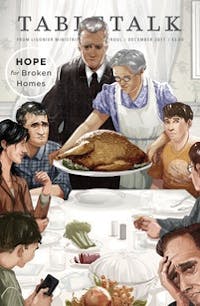
Request your free, three-month trial to Tabletalk magazine. You’ll receive the print issue monthly and gain immediate digital access to decades of archives. This trial is risk-free. No credit card required.
Try Tabletalk NowAlready receive Tabletalk magazine every month?
Verify your email address to gain unlimited access.
Broken homes are created by broken people. That is, before we can offer the balm of Gilead to those living in broken homes, we need to be perfectly clear how they got that way. For all the pressures assaulting the family, for all the allure of the world, and for all the temptations of the Devil, it is the flesh, our own sin natures, that destroy our homes. We are so self-deluded, however, that we have lost sight of how selfdestructive we are. We think we are but victims, when the hard truth is that we are villains.
Wisdom tells us, for instance, that a wise woman builds her house, but a foolish woman, with her own hands, tears it down (Prov. 14). Wives, who are called to be keepers at home (Titus 2), too often become destroyers of homes. In like manner, Proverbs also highlights at least one way that men destroy their own lives. Folly, like a carnal woman, beckons us, offering all her pleasures. But, the Bible tells us, her household is the way of Sheol, going down to the chambers of death (Prov. 7:27). Our homes are in shambles because our lives are in shambles.
We don’t, of course, do this on purpose. No one gleefully plans to destroy his own home. No man, when he begins to allow his eye to wander, determines that he wants to destroy not only his own life but the lives of his wife and children as well. No one self-consciously drops a bomb on his own house when he starts looking at the pictures on the Internet. What we do instead is determine that God is a liar.
He tells us, after all, not only what we are supposed to do and supposed not to do; He also tells us the fruits of our actions. He tells us that as we love our wives and children, we will rejoice with them at the table, our children arrayed like olive plants (Ps. 128). He also tells us that the unfaithful man hates himself, that our sins will find us out, and that when we sow the wind, we will assuredly reap the whirlwind. God tells us, shows us the very pathway toward blessing and joy, and we proudly blaze our own trails. Then, we wonder how we came to be broken and bloodied after falling off a cliff.
Our homes, however, can only begin to heal of their brokenness as we come to accept and understand our own brokenness. When we face up to the reality of our sin, when we confess the kind of people we are, God in His goodness draws near. He does, after all, give grace to the humble. That grace will not likely come in the form of the eradication of all our temptations. It may come, however, in helping us to see them for what they are — invitations to death.
They might also take a whole different form. When we recognize our own brokenness, we in turn know that we can’t trust ourselves. When left to ourselves we will choose for ourselves, and, in so doing, choose foolishly. This is why God has ordained the church to call us to faithfulness. Through the right preaching of the Word, we are reminded of His wisdom. Through the right exercise of the sacraments, we not only remember our brokenness but His faithfulness. We not only look back to our Husband dying for us at Calvary, His body broken and His blood spilled, but we look forward to the marriage feast of the Lamb. We enter into eternity and taste that He is good.
Church discipline, however, is another grace from God’s hand that helps us not to break our own homes. The elders of the church are called to speak into our broken homes, to call unfaithful husbands to repentance, to admonish straying wives to return home. They are to remind the whole congregation that those who practice these things will by no means inherit the kingdom of God (Gal. 5). They are to exercise the power of the keys.
Sadly, too often churches fail families here. They cover wounds lightly and leave the broken broken because they will not discipline where they must. They fear men, whether in the form of a loss of reputation or of civil repercussions. Too often, those called to shepherd the flock prove to be mere hirelings who look away when wolves break up and destroy homes. Being “nice” is so much easier than being first responders when homes become broken. It’s safer to run away from the problem than to run to it.
Our calling, however, is to set aside our worries and to seek first the kingdom of God and His righteousness. He is the true Shepherd. He guards the door to the kingdom. And we are called to fulfill His orders, no matter the cost. Little girls are looking to us, men, to rescue them from unfaithful daddies. Little boys are learning that men run when times get tough, first by watching their unfaithful daddies, then by watching their unfaithful elders. Husbands are left with no one and no way to correct wayward wives. And wives have no men to look after them. All because the church is broken. Repent, and seek His kingdom, His righteousness.
